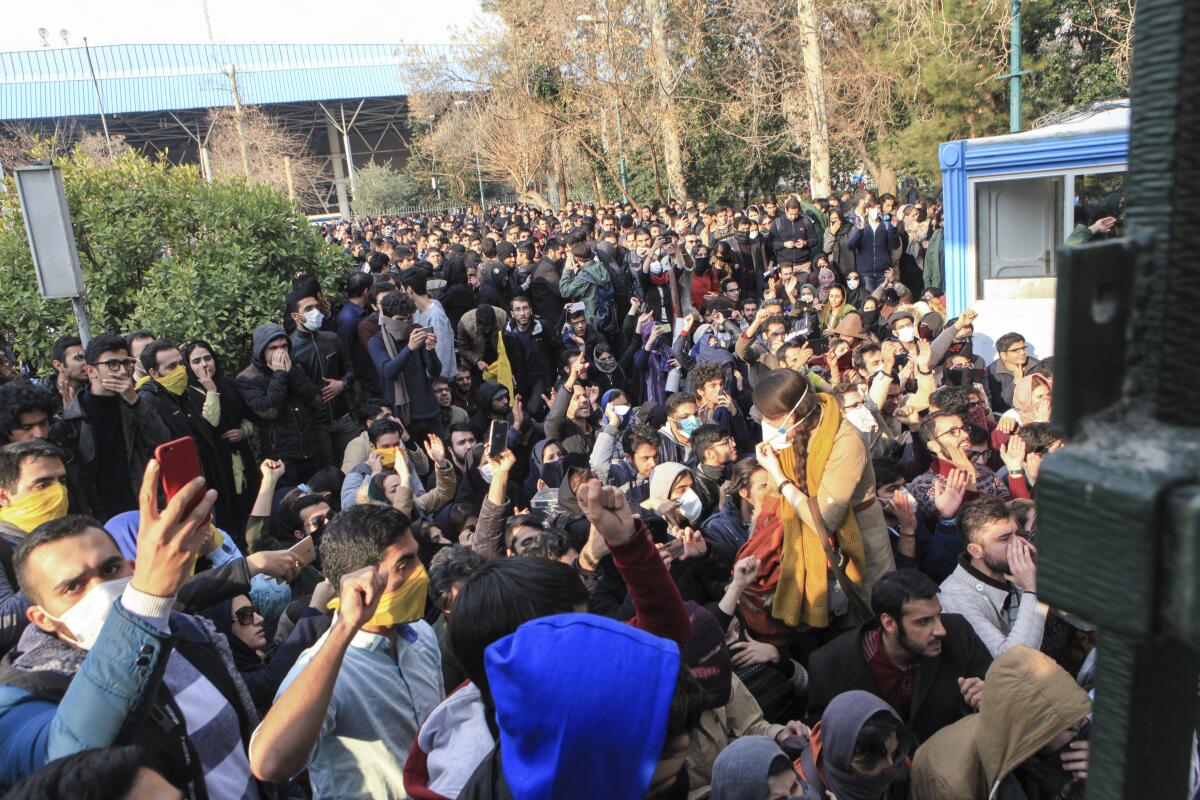Iranian journalist who fueled 2017 protests sentenced to death

- Share via
TEHRAN — Iran sentenced a once-exiled journalist to death over his online work that helped inspire nationwide economic protests that began at the end of 2017, authorities said Tuesday.
Ruhollah Zam’s website and a channel he created on the popular messaging app Telegram had spread word of the timings of the protests and embarrassing information about officials that directly challenged Iran’s Shiite theocracy. Those demonstrations represented the biggest challenge to the Islamic Republic since the 2009 Green Movement protests and set the stage for similar mass unrest in November 2019.
The details of his arrest remain unclear. Though he was based in Paris, Zam somehow returned to Iran and was detained by intelligence officials. A series of a televised confessions has aired in recent months over his work.
Judiciary spokesman Gholamhossein Esmaili announced Zam’s death sentence Tuesday, saying he had been convicted of “corruption on Earth,” a charge often used in cases involving espionage or attempts to overthrow Iran’s government. It was not immediately clear when the sentence was handed down.
Zam is able to appeal his sentence, issued by a Revolutionary Court. The name of his public defender wasn’t immediately known.
He had run a website called AmadNews that posted embarrassing videos and information about Iranian officials. He highlighted his work on a channel on Telegram, the secure messaging app that remains incredibly popular among Iranians.
The initial spark for the 2017 protests was a sudden jump in food prices. Many believe that hard-line opponents of President Hassan Rouhani instigated the first demonstrations in the conservative city of Mashhad in eastern Iran, trying to direct public anger at the president. But as protests spread from town to town, the backlash extended to the entire ruling class.
Soon, cries directly challenging Rouhani and even Supreme Leader Ayatollah Ali Khamenei could be heard in online videos shared by Zam. His channel also shared times and organizational details for the protests as well.
Telegram shut down the channel over Iranian government complaints that it spread information about how to make gasoline bombs. The channel later continued under a different name. Zam, who has said he fled Iran after being falsely accused of working with foreign intelligence services, denied inciting violence on Telegram at the time.
About 5,000 people were detained and 25 were killed in the 2017 protests, according to reports.
Zam is the son of Shiite cleric Mohammad Ali Zam, a reformist who once served in a government policy position in the early 1980s. The cleric wrote a letter published by Iranian media in July 2017 in which he said he wouldn’t support his son over AmadNews’ reporting and messages on its Telegram channel.
Interpol says it will not consider Iran’s request to help arrest President Trump. But the charges underscore heightened tensions between Iran and the U.S.
France’s Foreign Ministry described the death sentence for Zam as “a serious blow to freedom of expression and press freedom in Iran.” France abolished the death penalty in 1981, four years after its last decapitation. The ministry described the death penalty as “unjust, inhumane and ineffective” and said France opposes its use “everywhere and in all circumstances.”
Separately, the judiciary spokesman said an appeals court had upheld a previous prison sentence for Fariba Adelkhah, a prominent researcher with dual French-Iranian citizenship. Esmaili said that she received two separate sentences — five-year and one-year prison terms — on security charges and that under Iranian law, the longer sentence is the one a convict serves. He said her time spent in jail will count toward the sentence.
Iranian officials disclosed last July that Adelkhah had been arrested on espionage charges. Those charges were later dropped but security-related charges remained.
Adelkhah and her French fellow researcher, Roland Marchal, were held in Iran’s Evin Prison. Authorities released Marchal in March in an apparent prisoner swap for Iranian Jalal Ruhollahnejad, who had been held in France.
Iran, which does not recognize dual nationality for its citizens, has a track record of detaining dual nationals or those with ties to the West.
More to Read
Sign up for Essential California
The most important California stories and recommendations in your inbox every morning.
You may occasionally receive promotional content from the Los Angeles Times.













